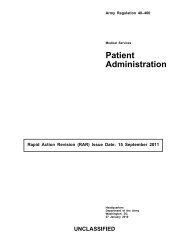AR 600-20, Army Command Policy - Army Publishing Directorate ...
AR 600-20, Army Command Policy - Army Publishing Directorate ...
AR 600-20, Army Command Policy - Army Publishing Directorate ...
You also want an ePaper? Increase the reach of your titles
YUMPU automatically turns print PDFs into web optimized ePapers that Google loves.
(10) Develop same-gender sponsorship guidelines for first-term Soldiers and include in <strong>AR</strong> <strong>600</strong>–8–8.<br />
m. Installation commanders (senior mission commanders, regional readiness commander, or state Joint Forces<br />
Headquarters level commanders). The installation commanders will—<br />
(1) Ensure that a sexual assault response capability is available 24 hours per day/7 days per week.<br />
(2) Provide UVAs and S<strong>AR</strong>Cs as needed for those <strong>Army</strong> units smaller than a battalion that are stationed on/near the<br />
installations, such as <strong>Army</strong> explosive ordinance detachments, <strong>Army</strong> counterintelligence units, Corps of Engineers<br />
elements, and so forth.<br />
(3) Coordinate with the Family advocacy program manager (FAPM) to ensure that MOUs/MOAs are in place if<br />
civilian agencies or other military Services are used as a victim services resource and that the S<strong>AR</strong>C has authority and<br />
support to coordinate with appropriate agencies.<br />
(4) Establish an active S<strong>AR</strong>B consistent with appendix F, of this regulation. The installation commander or his/her<br />
designated representative, at a minimum, will chair the S<strong>AR</strong>B. Other committee members may be appointed depending<br />
on the nature of their responsibilities as they pertain to SAPR. Installation commanders are responsible for maintaining<br />
a written summary of the discussions and decisions of each meeting.<br />
(5) Establish written procedures for reporting sexual assaults throughout the chain of command. These procedures<br />
must be written in a way so as not to be interpreted by subordinate commanders to mean that allegations must be<br />
disposed of in a particular manner that predetermined types or amounts of punishments are appropriate or that adverse<br />
action is required in all cases or in a particular case. Authority to dispose of cases that resulted from allegations of<br />
sexual assault is withheld to the Battalion commander level and above. A commander authorized to dispose of cases<br />
involving an allegation of sexual assault may do so only after receiving the advice of the servicing judge advocate. As<br />
with any case, any disposition decision involving an allegation of sexual assault is subject to review by higher level<br />
commanders, as appropriate.<br />
(6) Ensure Service members have access to a well-coordinated, highly responsive Victim Advocacy Program.<br />
(7) Provide the safest possible physical and emotional environment on post for all Soldiers, Family members, and<br />
other installation residents.<br />
(8) Integrate sexual assault awareness into installation newcomer orientation briefings and provide contact information<br />
for all installation level response agencies.<br />
(9) In coordination with FAPM and the Public Affairs Office, conduct media campaigns to ensure Soldiers are<br />
aware of the SAPR Program and publicize on- and off-post/non-<strong>Army</strong> agencies that are available to assist victims.<br />
(10) Publicize installation level information to provide leaders and Soldiers with contact information for all installation<br />
level response agencies, to include law enforcement, legal, medical, social services, and others.<br />
(11) Ensure all installation agencies and units comply with the rules of confidentiality (that is, restricted and<br />
unrestricted reporting) for Soldiers as stated in appendix H. However, no criminal investigation will be initiated unless<br />
originated from another source or the victim elects to come forward via unrestricted reporting.<br />
(12) In accordance with mission requirements, ensure SAPR Program initiatives do not impose artificial restrictions<br />
on a selected subgroup of personnel assigned (for example, curfews for women only).<br />
(13) Provide temporary living accommodations for Soldier victims at the victim’s request.<br />
(14) Identify sexual assault incident trends and take appropriate measures (that is, increased security patrols,<br />
enhanced education and training, enhanced environmental and safety measures) to prevent further sexual assaults.<br />
(15) Comply with <strong>AR</strong> <strong>600</strong>–8–8 and appoint same-gender sponsors for first-term Soldiers.<br />
(16) Provide sexual assault response services for sister Service units that are stationed on/near the installation.<br />
n. Installation provost marshals. The installation provost marshal will—<br />
(1) Respond to all incidents of sexual assault reported to law enforcement.<br />
(2) Ensure that law enforcement personnel responding to a sexual assault incident are trained in sensitivity to<br />
victims of sexual assault, victim assistance and resources, confidentiality, and related law enforcement investigative<br />
responses.<br />
(3) Immediately report incidents of sexual assault to the S<strong>AR</strong>C and escort victims from the crime scene when<br />
requested by the victim, their chain of command, or the CID.<br />
(4) Ensure that victims and witnesses are notified of their rights through a completed DD Form 2701 (Victims and<br />
Witnesses of Crime). When the installation provost marshal retains investigative authority and responsibility of a<br />
sexual assault incident, the victim and witness will be informed on the status of the investigative activity to the extent<br />
that such actions will not jeopardize an ongoing investigation.<br />
(5) Follow the procedures of <strong>AR</strong> 195–5 and <strong>AR</strong> 190–45 in documenting and reporting all reports of criminal<br />
activity.<br />
(6) Support data collection responsibilities of the installation S<strong>AR</strong>Cs for sexual assaults to the extent that such<br />
actions will not jeopardize an ongoing investigation or the rights of a potential subject in an ongoing investigation.<br />
(7) Seek to establish formal MOU with civilian law enforcement agencies to establish or improve the flow of<br />
information between their agencies. MOUs can be used to clarify jurisdictional issues for the investigation of incidents,<br />
to define the mechanism whereby local law enforcement reports involving AD Service members will be forwarded to<br />
<strong>AR</strong> <strong>600</strong>–<strong>20</strong> 18 March <strong>20</strong>08<br />
71
















